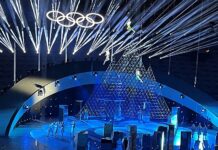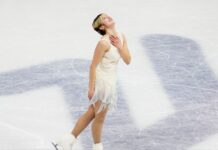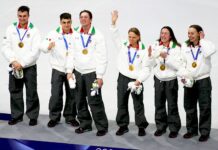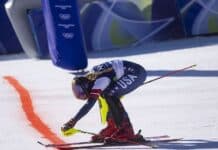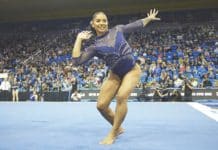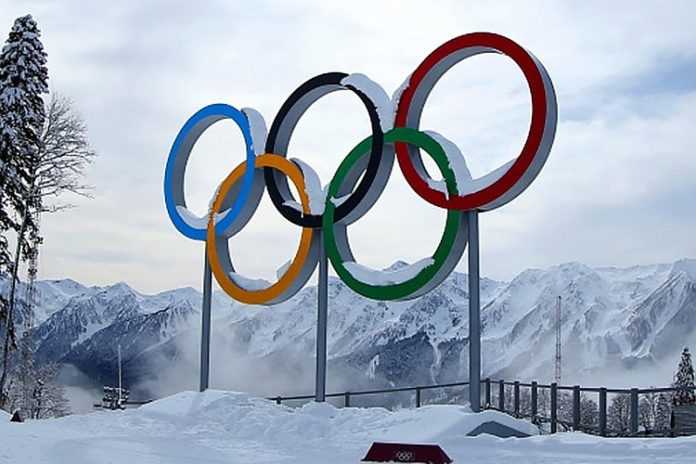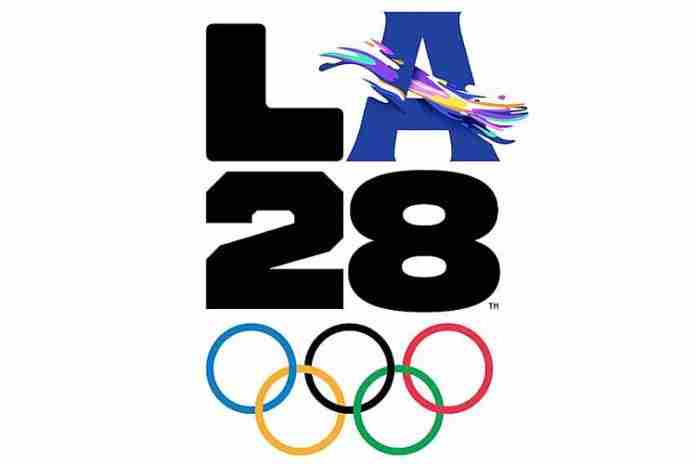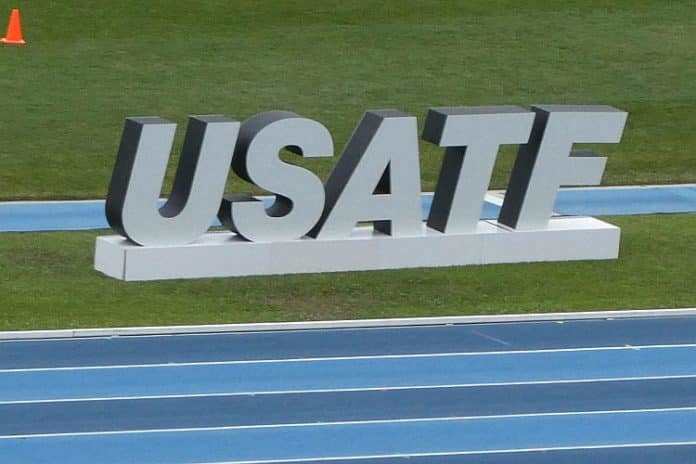★ The Sports Examiner: Chronicling the key competitive, economic and political forces shaping elite sport and the Olympic Movement.★
★ To get The Sports Examiner by e-mail: sign up here! ★
Happy Holidays!
≡ THE 5-RING CIRCUS ≡
1. IOC ready to disassemble Winter Games due to climate
2. World Athletics Champs social-media abuse up in 2023
3. USA Fencing’s Lee resigns as Board Chair amid allegations
4. ANOC refunded World Beach travel costs
5. ISU loses appeal on old eligibility rules at European Court of Justice
● A news story on Olympics.com explains how the International Olympic Committee is considering breaking apart mid-century Olympic Winter Games due to climate concerns. It’s radical.
● Social-media abuse remains at modest levels overall, but the number of incidents rose at the 2023 World Athletics Championships in Budapest. Some 47 athletes received abuse, of which 44% were Americans.
● Ivan Lee, a U.S. fencing Olympian in Sabre and a Hall of Famer, resigned as the head of the USA Fencing Board of Directors on Friday on an allegation of possible misconduct.
● The Association of National Olympic Committee saw its ANOC World Beach Games implode due to anti-Israel restrictions by host Indonesia, but did right by its partners and refunded the travel costs of the National Olympic Committees.
● The International Skating Union lost an appeal at the European Court of Justice over its old participation restrictions (since revised), which reinforced the idea that federations cannot maintain monopolistic control over athletes for the benefit of their own events.
● Panorama: Russia (2: Russians not allowed at 2024 Euro Track Cycling Champs in Apeldoorn; FIG relaxes Rhythmic uniform regulations for Russians as neutrals) = Alpine Skiing (Schwarz stars on second run to win at Madonna) = Football (FIFA Forward reports details $2.8 billion in worldwide grants) = Freestyle Skiing (2: surprise winners in Innichen Ski Cross; Anthony continues Moguls sweep) = Snowboard (Hofmeister remains undefeated in Parallel at Davos) = Swimming (2: Caesars to offer betting on February Worlds; Chinese star Sun appears out for Paris) ●
● Errata: Several readers noted an error in Friday’s post concerning Nick Ponzio, now suspended for doping for 18 months, in that he is not the Italian record holder in the men’s shot. He was the national indoor recordman in 2022, but was later passed by Zane Weir. Sorry about that. ●
1.
IOC ready to disassemble Winter Games due to climate
The International Olympic Committee has loudly worried about where mid-century editions of the Olympic Winter Games will be held.
Continuing climate issues have clouded the future adequacy of potential hosts for the snow events to the point where the event may be rotated among safe sites, or completely disassembled.
In a lengthy post for the Olympics.com site, former longtime Associated Press Olympic correspondent Steve Wilson (GBR) explored the current thinking about what to do about Winter Games as early as 2050.
Said Christophe Dubi, the IOC’s Olympic Games Executive Director:
“I don’t think there is a Doomsday scenario where we say, ‘OK, by 2050 no more Olympic Winter Games.’ But the Games will have had to have adapted themselves to the conditions at that point in time.
“Sometimes the period you are in requires longer-time thinking and sometimes it’s immediate actions that are needed. I think for the Winter Olympics we are at a point where both are needed. We need to find some really compelling evolutions for the immediate future.”
The short-term answer came on 29 November as the IOC Executive Board selected the French Alps bid for “targeted dialogue” with a view to selection as host for 2030, Salt Lake City for 2034 and a “preferred” dialogue with Switzerland to modify its bid in order to be selected for 2038. That will give the IOC some time to figure what to do in the 2040s.
The story also specified requirements in finer detail:
“The [Executive Board] recommended that the IOC targets future potential hosts that use, if possible, only existing or temporary venues and offer snow sports venues that would be climate-reliable until at least 2050, with projected average temperatures below 0 degrees Celsius [32 F] during the Games period.”
The IOC’s own study indicated that suitable Winter Games hosts – by weather – are currently available in 15 countries, in which at least 80% of the sites required for the Games are extant. That number could drop to 10-12 by 2050 and possibly less by 2100.
A rotation system for the Winter Games is possible, but also has issues, such as if a country or community sours on the idea.
But there is also now consideration of disassembling the organization of the Winter Games, described with much more detail by Wilson:
● “The idea is to introduce a decentralised system in which the cost of organising the Olympic competitions would be based on the costs associated with world championships in each sport. [IOC Future Host Commission/Winter Chair Karl Stoss (AUT)] noted that the cost of certain Olympic events was four times higher than at world championships.
“‘There is no reason for such a difference in costs,’ he said. ‘There is a difference between ‘nice to have’ and ‘need to have’.”
● “Organisation of certain Olympic sports competitions would be outsourced to the experienced international and national event organisers who run World Cup and World Championship events on a regular basis. This would of course be contextual and depend on the experience in each market. …
● “Procurement would be left to separate organising committees at each of the venues. Hosts would sign up local sponsors earlier to lock in revenue for their Games budgets. Major budget items would be front-loaded to ease financial strains.”
This is a completely new concept for an Olympic Games of any kind. It foresees no requirement for an Olympic Village, and creates a hub for the Games wherever the ice events are – curling, ice hockey and the skating disciplines – and leaves the snow events to be distributed widely. That includes alpine skiing, biathlon, bobsled-luge-skeleton, the Nordic skiing disciplines, freestyle and snowboard and so on.
It’s not a traditional Winter Games, but more a collection of world championship-class events tied together by a common schedule, environmental graphics and worldwide television.
It may or may not be better, but it is a sustainable future concept, in which the Olympic program could be completely exploded to create a 24-hours-a-day “Winter Games” in which events are held in multiple countries on multiple continents across a two-week period.
Observed: Dubi has been clear in news briefings that this kind of thinking should also take the Olympic Games into account as well. The future of events, from the IOC’s point of view, is dependent on the weather and how it will be controlled to allow athletes to compete at their best and allow spectators to watch them in reasonable conditions.
This is a much better way to approach the Olympic Games from a cost standpoint than currently used, but the true discipline – not specially mentioned by Dubi, but obvious – is to rein in the wishes of the International Federations, who insist on Olympic perfection at any cost, since they aren’t paying for it, even if they expect less from their world championship hosts.
That may be more challenging than finding acceptable winter weather.
2.
World Athletics Champs social-media abuse up in 2023
As part of its safeguarding efforts, World Athletics has undertaken a measurement of social media abuse at its major events over the past three years, with the 2023 study by ThreatMatrix showing an increase in abusive posts on Instagram and X (ex-Twitter) compared to the Oregon 22 Worlds. The numbers for Tokyo 2020, Oregon 22 and Budapest 2023:
Tokyo 2020:
● 240,707 tweets analyzed
● 161 tracked athletes
● 132 discriminatory posts from 119 authors (0.05%)
● 23 athletes received abuse: 70% women, 30% men
Oregon 2022:
● 427,624 posts on Instagram and Twitter analyzed
● 461 tracked athletes
● 59 discriminatory posts from 57 authors (0.01%)
● 27 athletes received abuse: 70% women, 30% men
Budapest 2023:
● 449,209 posts on Instagram and X analyzed
● 1,344 tracked athletes (77.5% on Instagram)
● 258 discriminatory posts from 237 authors (0.06%)
● 47 athletes received abuse: 51% men, 49% women
● Abuse was 90% on Twitter, 10% on Instagram
The kinds of abuse were fairly consistent:
● Tokyo: 29% sexist, 26% racist, 25% doping
● Oregon: 29% sexist, 20% slurs, 19% racist
● Budapest: 35% racist, 16% sexual, 15% general abuse
Each event had its own characteristics, with 63% of abuse in Tokyo targeted at just two athletes (both American women); two athletes received almost 40% of the Oregon 22 abuse (one man, one woman), and in Budapest, two athletes received 44% of all abuse and U.S. athletes were targeted for 44% of abuse. None of the athletes targeted were identified in the reports.
Observed: Happily, the numbers are fairly small in terms of percentages, and the percentage of athletes targeted has gone down considerably, from 14.3% of the Tokyo 2020 sample, down to 5.8% of the Oregon 22 sample and 3.5% (47/1,344) for Budapest. The Budapest figures also show the importance of Instagram as a primary social-media follow site for track & field athletes, far more than Twitter, which was also much more the focal point of abuse.
3.
USA Fencing’s Lee resigns as Board Chair amid allegations
A stunning Friday message sent to USA Fencing members included:
“Recently, USA Fencing received information alleging conduct by our Board Chair, Mr. Ivan Lee, that would constitute a violation of the SafeSport Code. In line with our unwavering commitment to the safety of our athletes and the fencing community, we immediately reported the information to the U.S. Center for SafeSport, and have taken immediate action to suspend Mr. Lee, member No. 100004642, from USA Fencing, effective Dec. 22, 2023.
“Upon being informed of his suspension, Mr. Lee voluntarily resigned from his positions as Chair and At-Large Member of the USA Fencing Board of Directors.
“In light of Mr. Lee’s resignation, the Board of Directors held an emergency session and voted to name Mr. David Arias as the new Chair of the Board. The emergency session was led by Arias, USA Fencing’s most recent Chair.”
Lee, 42, was a three-time Worlds medal winner in the men’s Sabre division in 1998-2000-01, a 2004 Olympian, was inducted into the USA Fencing Hall of Fame in 2004 and after retiring from the New York Police Department, became the coach of the Long Island University women’s fencing team. He resigned as the LIU coach in mid-December.
He was elected as an At-Large Board member of USA Fencing in June 2023 and was elected as the Board Chair in September. A Board meeting was held on 16 December, but an emergency meeting was held on Friday (22nd) to consider the situation concerning Lee.
With the report of the allegation of misconduct to the U.S. Center for SafeSport, that organization will have jurisdiction over the investigation and consideration of possible sanctions against Lee, which can be appealed.
USA Fencing has been hit with several SafeSport-related issues over the past few years, and Arias is taking a second turn as temporary Chair, after he stepped following a Board revolt removed elected federation President Peter Burchard in October 2021. Arias wrote in a Reddit post on Friday:
“On Friday, I was asked to be chair again but remember that the current Chair position can be changed again at anytime. I can do the job well for now but don’t expect to be Chair past this Season. …
“Lastly, I consider a big part of my job is to find my replacement, and encourage others to get involved as Committee or Board members.”
4.
ANOC refunded World Beach travel costs
It seems like a long time ago, when Indonesia’s ban on Israel’s participation in the ANOC World Beach Games forced its cancellation on 4 July on the excuse that the government’s funding was not available.
But the Association of National Olympic Committees did not walk away from its constituents, as noted by ANOC chief Robin Mitchell (FIJ) in his year-end message:
“For ANOC, we cannot reflect on this year without acknowledging the great disappointment of the cancellation of the ANOC World Beach Games Bali 2023. We at ANOC worked hard to minimise the impact of the cancellation with the full reimbursement of NOCs’ travel expenses processed in less than three months.
“However, we recognise that this does not make up for the athletes who missed out on the chance to fulfil their dream. We have a responsibility to them to learn lessons from this most regrettable situation and turn it into an opportunity to build for a stronger future.
“With that in mind, the ANOC Executive Council, at its recent meeting, approved the creation of a Working Group to analyse the Games concept and ensure that it is delivering maximum value to NOCs and their athletes, IFs and other stakeholders.”
Observed: It will be fascinating to see how ANOC deals with the Indonesian refusal to allow Israel to participate in planning any future editions of the World Beach Games, especially now that Israel and Ukraine are both now fighting off invasions, by Hamas in Gaza and Russia in eastern Ukraine.
The IOC, interestingly, by changing from a pure voting process to select Olympic hosts, which ended up in the selection of Beijing for the 2008 Olympic Games and Sochi for the 2014 Winter Games and Beijing again for 2022, has now selected Paris, Milan-Cortina, Los Angeles, the French Alps, Brisbane and Salt Lake City for 2024-26-28-30-32, assuming the “targeted dialogue” protocol for 2030 and 2034 results in final selection as hosts in 2024.
What path will ANOC follow, and what guarantees will it requires vis-a-vis Israel in the future?
5.
ISU loses appeal on old eligibility rules at
European Court of Justice
A long-running legal battle over then-current regulations of the International Skating Union about competing in non-ISU events appeared to be settled on Thursday as the European Court of Justice decided against the ISU’s appeal of a 2020 General Court of the European Court holding that the ISU’s then-rules were illegal. The ECJ summary:
“Following the European Commission and the General Court, the Court of Justice confirms that the rules of the International Skating Union, which empower it to subject international skating competitions to its approval and to impose severe penalties on athletes who take part in unauthorised competitions, are unlawful because they are not subject to any guarantee ensuring that they are transparent, objective, non-discriminatory and proportionate. They give the ISU a clear advantage over its competitors and have unfavourable effects for athletes as well as consumers and broadcast audiences.”
In other words, an international sports federation may not enforce an absolute monopoly on participation limited to its own events.
The case was brought in June 2014 by Dutch speed skaters Mark Tuitert – the 2010 Olympic gold medalist in the men’s 1,500 m – and Niels Kerstholt, who wanted to compete in an “Ice Derby” event in Dubai (UAE), an event with which the ISU had concerns over ties to gambling interests. While this reason was seen as legitimate, the ISU’s rules at the time were considered so severe – potential lifetime bans for any athlete competing an event not previously authorized by the ISU – that they had to be overturned.
(The event, which was supposed to pay prize money of $2 million, never took place.)
The ISU changed its rules in 2018, so the holding in the case does not impact their current regulations, which now include, Rule 102 (1)(c):
“Participation of Skaters and Officials in national competitions and in non-competitive events, e.g. appearances, endorsements, exhibitions, shows and other events with a recreational or show type character are subject to respective rules and conditions of their ISU Members only.
“Such rules and conditions are not part of the ISU eligibility rules under this Rule 102. However, ISU Members may not unduly restrict their Skaters to participate in non-competitive events. They may share payments received by their Skaters for participation in such noncompetitive events in consideration of past and present support of such Skaters, but with no more than 10%.”
Based on these changes, the ISU shrugged off the loss, with a statement that noted in part:
“The ISU takes note of the judgment of the Court of Justice of the European Union issued today. The ISU procedure considered in the judgment was amended in 2018 following discussions with the European Commission with a view to implementing its decision of 8 December 2017. The Court of Justice judgment has thus no impact on the ISU’ s current procedure for approving third party skating events.”
The European Court of Justice did award costs to the athletes in accordance with the sections of the prior holding of the General Court in which they were held to be correct.
≡ PANORAMA ≡
● Russia ● The Union Cycliste Internationale has allowed Russian and Belarusian cyclists who are “neutral” to compete in its events, but its approval is no guarantee of acceptance.
With the European Track Cycling Championship coming up from 1-14 January in Apeldoorn (NED), the Dutch government is not allowing Russian or Belarusian entries. The Russian news agency TASS reported comments from the coach of the Russian track cycling team, Alexander Kuznetsov:
“The Dutch authorities opposed the participation of our athletes in the European Track Cycling Championships. A letter with this content was received today. The European Cycling Union has nothing to do with this ban.”
¶
In gymnastics, TASS reported that the Federation Internationale de Gymnastique (FIG) has relaxed its rules slightly for rhythmic gymnastics uniforms:
“[T]he International Gymnastics Federation decided to lift the color restrictions, requiring athletes to obtain prior approval from the FIG for competition clothing and apparatus for rhythmic gymnastics. Any use of clothing other than that which has been approved by the International Federation shall result in the athlete’s refusal to participate in the competition or disqualification. The ban on the use of national symbols, as well as symbols of national federations and Olympic committees of countries, has been maintained.”
The original restrictions had required rhythmic gymnasts to wear only white.
● Alpine Skiing ● Austria’s Marco Schwarz picked up his sixth career World Cup gold with a victory at Madonna di Campiglio (ITA) in the men’s Slalom on Friday.
He was only sixth after the first run, with France’s 2022 Olympic slalom Champion Clement Noel the leader. But Schwarz’s second run put him in the lead, with the top five finishing between 16th and 22nd-fastest on the second run, or failing to finish. Schwarz had the third-best second run and won at 1:40.51, ahead of Noel (1:40.76) and Britain’s Dave Ryding, who moved up from 18th with the second-fastest second run in the field (1:40.90).
Next up are a Downhill and Super-G in Bormio (ITA) on 28-29 December.
● Football ● FIFA released its FIFA Forward report for 2016-22, showing distribution of $2.792.2 billion to its 211 member association and the regional confederations.
The confederation spending of $546.0 million was firstly aimed toward competitions ($157.3 million or 28.8%), then development ($87.2 million), zonal associations ($78.0 million), governance ($72.2 million) and women’s football ($62.1 million).
The much-larger distribution of $2.246.2 billion was to the member federations and significantly funded federation operations, infrastructure and national teams:
● $459.1 million for administration and governance
● $421.4 million for infrastructure support
● $360.8 million for national teams
● $198.0 million for competitions
● $182.1 million for equipment
● $116.2 million for women’s football
The infrastructure funding created 577 new and renovated fields, 208 competitions that involved 19.517 clubs or teams, national team support for 175 training camps and 234 tournaments and learning and training programs for 190,622 coaches, administrators, referees and others.
In terms of the geographic distribution:
● $518.7 million: Africa
● $494.3 million: UEFA
● $406.7 million: Asia
● $328.0 million: CONCACAF
● $110.6 million: Oceania
● $89.6 million: CONMEBOL
And the U.S.? The U.S. Soccer Federation received $8.7 million in grants, with the largest portion going to women’s football ($2.8 million), with development activities getting $2.0 million and $1.5 million for competitions.
● Freestyle Skiing ● Friday’s second of two competitions in Ski Cross at Innichen (ITA) went to France’s Terence Tchiknavorian, who took his first World Cup medal in a year and got the third win of his career. He got to the line ahead of Germans Tim Hronek and 2023 Worlds silver medalist Florian Wilmsman.
The women’s race went to Sixtine Cousin (SUI), 24, who won her first-ever World Cup medal, ahead of France’s Marielle Berger Sabbatel and Olympic champ Sandra Naeslund (SWE). It’s the fourth seasonal medal in five races for Berger Sabbatel and third for Naeslund, the seasonal leader.
¶
In the Moguls events in Bakuriani (GEO), Australia’s 2022 Olympic champion, Jakara Anthony, is on a roll.
She won her fourth straight Moguls event in four tries on Friday, scoring 79.08 to beat Rino Yanagimoto (JPN: 77.10) and Hannah Soar of the U.S. (71.18), then came back and won her second straight Dual Moguls title on Saturday. She defeated Maia Schwinghammer (CAN) in the final; Anthony now has won six of the seven Moguls-Dual Moguls events held this season, and took the bronze in the other.
In the all-American bronze-medal race, Olympic Moguls silver winner Jaelin Kauf won over Alli Macuga.
The men’s race had familiar faces on the podium, with Japan’s 2017 World Champion Ikuma Horishima winning the Moguls gold, 77.11 to 75.85 over Sweden’s Filip Gravenfors, with all-time great Mikael Kingsbury (CAN: 75.21) third and American Nick Page fourth (73.42).
In the Dual Moguls, Kingsbury won his 84th World Cup gold – extending his own record – by defeating Horishima in the final; Page won the bronze over Gravenfors. It’s Page’s fifth career World Cup medal.
● Snowboard ● Saturday’s Parallel Slalom at Davos (SUI) was a surprise win for Italy’s Daniele Bagozza in the men’s race, crossing the line ahead of Arvid Auner (AUT) for his first World Cup medal – and first win – since January of 2020! Fellow Italian Edwin Coratti got his second medal of the season in third and took the seasonal points lead after three of 14 races.
The women’s final was another win – her third in a row – for German Ramona Theresia Hofmeister, the 2018 Olympic Parallel Giant Slalom bronzer. She sailed past Italian Lucia Dalmasso, who won her second consecutive silver, with Austria’s Worlds bronze medalist Sabine Schoeffmann taking her second straight bronze.
● Swimming ● SwimSwam.com reported that Caesars Sportsbook will offer odds and wagering on the swimming sector of the 2024 World Aquatics Championships to be held on Doha (QAT) next February.
Adam Pullen, Assistant Director of Trading, explained:
“I think swimming is one of the best, one of the more interesting sports to watch and wager on … We’ve seen a lot of interest – a lot of things can happen. You’re deciding races by hundredths of seconds, and it definitely gets the blood flowing when you got a little action on it, too.”
He said that the experience generated by the Doha Worlds will help in setting odds for the Paris Olympic Games next July.
¶
The wait to see if Chinese distance star Yang Sun – the six-time Olympic medalist in the 200-400-1,500 m Freestyles – who was banned for refusing to cooperate with a test in September 2018 and eventually had a ban imposed of four years and three months, would be selected for the 2024 Olympic Games appears to be over.
Sun’s suspension is due to be completed in May, but the Chinese swimming federation announced criteria which emphasize the 2022 and 2023 World Championships – in which he did not compete – and the April 2024 Chinese national championships.
The regulations specifically note that swimmers who have been sanctioned for doping for more than a year are not eligible. That’s lets the 32-year-old Sun out for sure.
¶
You can receive our exclusive TSX Report by e-mail by clicking here. You can also refer a friend by clicking here, and can donate here to keep this site going.
For our updated, 850-event International Sports Calendar (no. 4) for 2023 and beyond, by date and by sport, click here!











